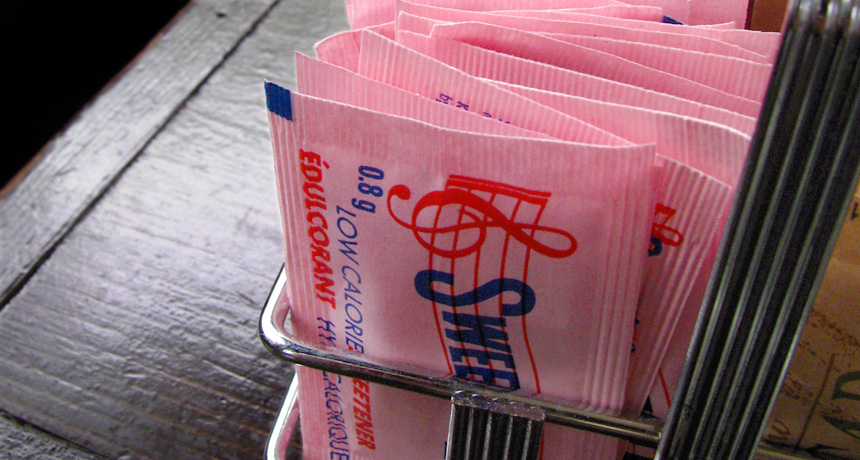Artificial sweeteners may evict good gut microbes
人工合成甜味剂可能会清理掉肠道内部的有益细菌
To avoid the calories in sugar, dieters often sweeten foods and drinks with no-calorie substitutes, such as saccharin. But this fake sugar could have unexpected side effects, a new study finds. Its authors show that a high-saccharin diet causes changes in mice and people that could lead to obesity or type 2 diabetes. The sweetener did that by altering microbes in the gut. Other sweeteners would likely cause similar problems, the researchers say.
为避免糖分中过多的热量,节食者通常会在饮料和食物中添加零热量替代物将其变甜,比如说糖精。但是一项新研究发现这种"伪糖"也可能会产生意想不到的副作用。作者说明了高糖精饮食会引起老鼠和人体内部系统发生改变,通过改变肠道内的微细菌最终导致肥胖或二型糖尿病。研究者表示其他甜料也会引起类似的问题。
This research suggests "there could be unintended consequences" of using sugar substitutes, Robert Margolskee told Science News. He's a neuroscientist at the Monell Chemical Senses Center in Philadelphia, Pa. He was not involved in the new work. "This is very interesting and scary if it really does hold for humans," he says.
宾夕法尼亚州费城莫奈尔化学感官中心的神经系统科学家Robert Margolskee告诉科学新闻使用糖的替代品会有"意外结果"产生,Robert没有参加此次研究,但他表示如果这一发现真的会给人类带来这样的结果那么真的是既有趣又恐怖。

Until recently, most people thought artificial (no-calorie) sweeteners passed through the body without doing anything. That's what makes them appealing. They add a sweet taste without the caloric cost. Many diet foods, from soft drinks to desserts, are sweetened with these substances. But that may come with a different cost.
近来很多人仍以为食用过人工甜味剂(零热量糖精)后不会给身体造成任何影响。这也是它们吸引人的原因之一。它们会在不增加任何热量的情况下把食物变甜。许多减肥食物,像软饮和甜品等添加过这种甜料后都会变甜,但更大的代价可能也会随之出现。
To probe the sweeteners' effects, Eran Segal and Eran Elinav ran tests on mice. Segal is a computational biologist. Elinav is an immunologist. Both researchers work at the Weizmann Institute of Science in Rehovot, Israel. The researchers added artificial sweeteners to the animals' drinking water. Those sweeteners included saccharin, aspartame and sucralose.
为了探究甜料对食用者的影响,Eran Segal和Eran Elinav对老鼠进行了实验。前者是一名计算生物学家,后者是一名免疫学者。两位研究员均在以色列雷霍沃特威茨曼科学研究学院工作。他们把糖精,阿斯巴甜和三氯蔗糖等人工甜料加进动物的饮用水中。
After 11 weeks, the animals showed problems with their metabolism. Unusually high levels of a type of sugar called glucose circulated in their blood after meals. This suggested the sweeteners impaired their bodies' ability to process glucose.
11周后,这些动物的新陈代谢开始出现问题。通常饭后他们血液里会循环流淌着一种叫做种葡萄糖的糖类,这一现象说明了人工甜料已经损坏了他们自身加工处理葡萄糖的能力。












